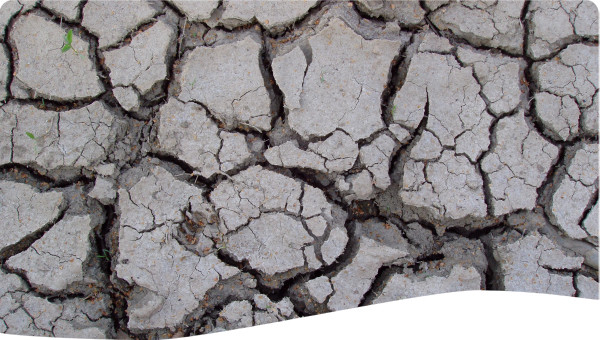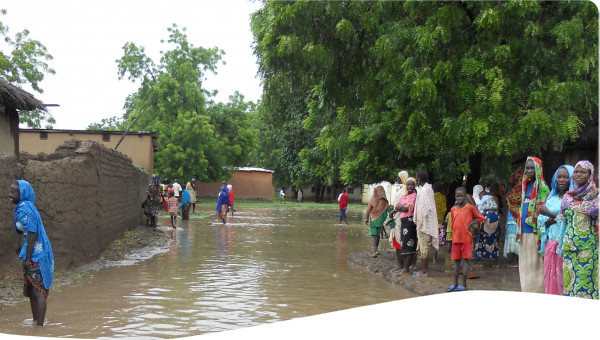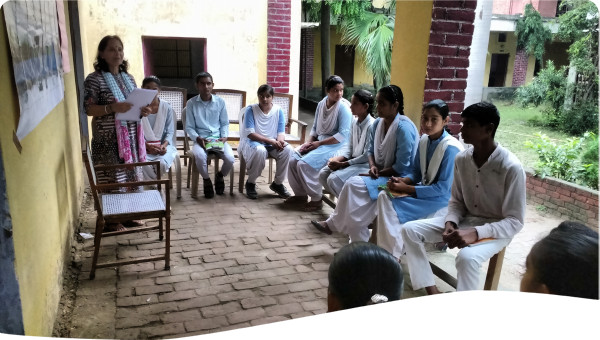From 2010 to 2020, Global Water Partnership West Africa (GWP-WA) has developed several initiatives that have contributed to making rural and semi-urban communities in countries of the region, particularly youth and women's associations, actors for climate resilient development. Emphasis has been placed on the development of training tools and modules, delivering of training and awareness-raising sessions, advisory support and assistance in implementing pilot actions in response to climate change related threats.
Given its socio-economic and environmental context, West Africa is one of the least favoured regions in the world. Its populations are very vulnerable to the negative impacts of climate change. The States have difficulties in addressing these challenges due to the weakness and/or inadequacy of their action and organisational capacities, the weakness of the governance framework for managing climate variability and change, as well as difficulties in raising the required financial resources.
States generally have strategy documents, policies or plans for managing water resources and for managing the impacts of climate change. However, their implementation is often problematic due to, among other things, the gap in forward-looking development planning between the national and local levels. Communities also need support adapted to their realities. In response to this problem, GWP, as part of its climate portfolio, developed and implemented a series of initiatives during the 2010 decade. These include the Water, Climate and Development Programme in Africa (WACDEP), Integrated Drought Management Project in West Africa (IDMP-WA) and the #YourFutureYourClimate project (#TFTC).
These initiatives, which include community support components, were implemented in Benin, Burkina Faso, Ghana, Mali, Niger and Togo. They have focused on finding endogenous responses to the lack of community capacity for water security and climate resilience, the low level of access to and use of drought adaptation technologies, and the lack of organisational capacity at different levels to set up and successfully implement climate-sensitive projects, particularly those led by youth and women.
Based on the knowledge of climate and the needs of population to adapt to disaster risks, including those related to drought, particularly in Sahelian countries, the aim was to support optimised water and land management and to develop actions that provide appropriate solutions to stakeholders' concerns.
GWP-WA's approach has been to facilitate stakeholders consultations on the issue of climate change and its impacts on water resources and their use for socio-economic development, to assess capacity building needs, to develop innovative approaches and tools for action, and to design and implement pilot projects for the benefit of communities and youth and women's associations. It also aimed to increase awareness and understanding of climate change and its impacts on communities' livelihoods and incomes as well as on the environment. The organisation of capacity building and awareness raising sessions for communities and associations for the development of climate initiatives has therefore been an important focus.
The WACDEP, developed in response to the Sharm El Sheikh Declaration on Water and Sanitation adopted by the African Union in 2008, was taken to the highest level by the African Ministers' Council on Water (AMCOW). Its objectives were to assist countries to integrate water security and climate resilience into development planning and decision-making processes with a view to build climate resilience, particularly through increased investment in water security; to develop partnerships and capacities of institutions and stakeholders to build climate resilience through improved water management; and to support the development of investment strategies and project documents to access funding for water security and climate resilience. In particular, better water resources management to increase climate resilience and improve living conditions of communities was expected.
An important part of the WACDEP activities has been the establishment of a framework to facilitate adaptation to climate change, including development planning and stakeholder engagement at local, national and regional levels. WACDEP developed the technical background document, the Strategic Framework for Water Security and Climate Resilient Development. The choice was also made to support the implementation of pilot actions to demonstrate innovative techniques with tangible impacts that contribute to ensuring water security and climate resilience and improving the living conditions of communities.
Similarly, actions have been implemented within the framework of the joint Integrated Drought Management Programme (IDMP) of the World Meteorological Organisation (WMO) and GWP launched in 2013 via the regional component of the Integrated Drought Management Project in West Africa (IDMP-WA). This project, developed according to the approach of the Strategic Framework for Water Security and Climate Resilient Development, has, since 2015, helped building the capacity of key stakeholders in the field of Integrated Drought Management (IDM). Conceived as an offshoot of WACDEP, it has also set up pilot actions to support communities and accompany youth and women's associations in their organisation. Activities have been carried out in Burkina Faso, Niger and Mali. GWP-WA also contributed to the implementation and/or support of some activities carried out by the National Youth Parliaments for Water in Benin, Burkina Faso and Togo.
The experiences capitalised in the framework of WAC-DEP and IDMP-WA have been used by GWP-WA in partnership with the International Water Secretariat (ISW) to develop a programme aiming at integrating young people in the decision-making process and the implementation of adaptation and resilience actions to cli- mate change in Benin, Burkina Faso and Togo. This is the #YourFutureYourClimate (#TFTC) initiative funded under the International Climate Cooperation Pro- gramme by the Government of Quebec and GWP. The project aims to support rural and semi-urban youth to become agents of change for climate action and entrepreneurs who contribute to improving the livelihoods of their communities in the three countries.
1. Capacity Building for Integrated Drought Management and Climate Change Adaptation
GWP-WA has facilitated stakeholders consultations and several dozen training and awareness sessions. Publications were also produced and widely disseminated.
2. Relevance of pilot projects on the valorisation of drought adaptation technologies developed and implemented through the GWP-WA network
The valorisation consisted of targeted actions responding to the needs of youth and women, with the capacity to produce significant impacts at the community level, in particular on climate change adaptation practices.
3. Implementation of a drip irrigation system using solar energy for pumping water in the rural municipality of Loumbila in Burkina Faso
This system has inspired communities from neighbouring villages and rural development partners from the intervention area who have visited the site.
4. Promotion of innovative drought resilient practices through the establishment of a multifunctional agroforestry park in the municipality of Komki-Ipala in Burkina Faso
With the support of the local authorities, the village association, young people and women have used assisted natural soil regeneration techniques as an alternative to the traditional reforestation model.
5. Development of CES/DRS14 actions for agricultural, forestry and pastoral purposes and communication for climate action in the municipality of Gouendo in Mali
The action also included an awareness-raising component, with the holding of 16 sessions on the fight against the effects of climate change and the provision of information.
6. Development of the irrigated crop site for women of Kankantouti in Niger
CWP-Niger provided local support for the acquisition of seeds and their distribution to women of the village of Kankantouti, the creation of nurseries and the preparation of plots of land, as well as training and supervision for production and agri-food processing. Altogether, more than 70 women have benefited directly from this action. They were able to increase their production by 25 to 200%.
7. Building community resilience in the Bawku Municipality, Binduri and Bongo districts of Ghana
Capacity building of communities in nursery development should ensure the sustainability of the project beyond the intervention. Another important result was the direct support of 300 farmers through income-generating activities. The indirect beneficiaries of the project, all types of actions combined, are estimated at 3,500.
8. Young actors of change serving their communities through concrete interventions for climate action with the #TFTC project
#TFTC aims to develop sustainable, economically viable and replicable projects designed, planned and implemented by young leaders from rural and semi-urban areas, with the support of local partner organisations.
In Benin, the project focused on supporting the restoration of degraded ecosystems in the headwaters of the Mékrou River with three youth associations as partners. It had 3 components: capacity building, promotion of the use of improved stoves, and environmental education and reforestation.
In Burkina Faso, #TFTC increased the resilience of rural youth to climate change. 2 actions have been implemented: the use of water-saving and clean energy technologies for agricultural production and the improvement of the employability of young people who have become development actors in their communities.
In Togo, #TFTC improved the living conditions of young people, and integrated soil, water and environmental protection activities led by young people. The project included the training of 40 members of associations and 30 community leaders on the Community Led Total Sanitation (CLTS) approach. In addition, 40 young people, including 15 women, were trained in nursery production and maintenance techniques. Finally, 5 youth associations were trained in the management and keeping of administrative and accounting documents of an association.
Key factors for successful interventions are: involvement of traditional authorities to mobilise communities in an environment of mutual trust; involvement of technical services, resource persons and other organisations working in climate risk management to demonstrate innovative techniques.
Other key factors for successful interventions are: empowerment of youth, leaders, women and communities as a whole for the ownership of sustainable natural resource management practices at the grassroots level; establishment of land transfer documents to the communities concerned by the implementation of the projects, with the signature of the rightful owners.
 Case studies
Case studies

